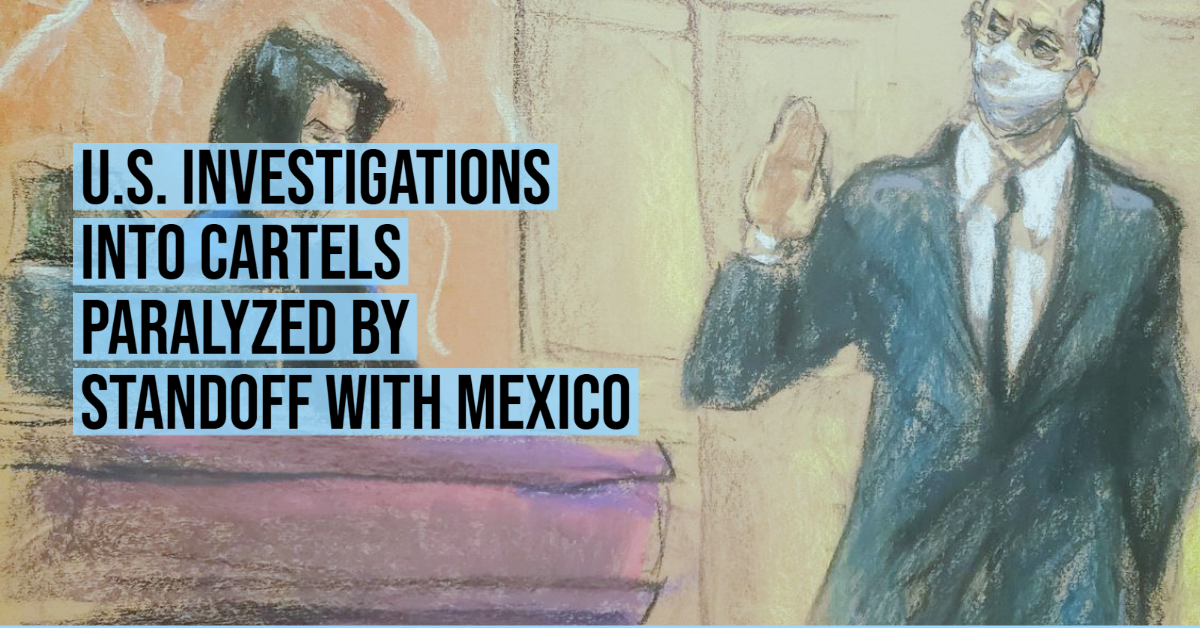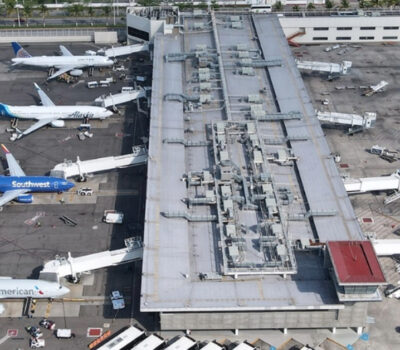U.S. efforts to battle powerful drug cartels from inside Mexico have ground to a halt since January as strained relations between the two countries have frozen attempts to corral drug kingpins, according to current and former senior officials in both nations.
Until recently, U.S. and Mexican authorities routinely, if cautiously, shared intelligence on major cases. But in December, Mexico enacted a law requiring U.S. authorities to report their law-enforcement contacts in the country to the Mexican government, which American investigators widely view as corrupt. The new policy has led investigators on both sides of the border to pause their cooperation, fearful that the new disclosure rules could compromise cases – or worse, get informants or Mexican officials helping the Americans killed.
On-the-ground operations, including raids on Mexican drug labs, have largely ceased and U.S. authorities are now struggling to track movements of U.S.-bound cocaine from Venezuela and Colombia through Central America and into Mexico, according to two sources familiar with the matter. Some U.S. drug agents working in Mexico reported that they had been tailed by local police, raising alarms about their safety. And dozens of U.S. law enforcement agents can’t get visas to work in Mexico.
“Most of our most important cases are at a standstill,” a senior U.S. law enforcement official told Reuters. “If we have to report our sources to their foreign ministry, it jeopardizes our sources and methods. The system is set up intentionally now so that Mexican law enforcement can’t help us.”
A senior Mexican military official said his country has engaged in virtually no anti-drug efforts with the United States since the new law was passed.
“Without U.S. support – in technology and intelligence – it will be more difficult to contain crime,” the official said.
Spokespersons from Mexico’s Secretariat of Public Security, the foreign ministry and the Mexican Navy, which play leading roles in the county’s international drug interdiction efforts, did not respond to queries for this article. But a Mexican official familiar with the matter described the rift as more administrative and temporary than substantive.
“It’s not that cooperation is now paralyzed,” the official said, speaking on condition of anonymity. The official predicted that things will return to normal when it becomes clear which Mexican officials will have access to sensitive information.
Mexico adopted the new law shortly after the United States arrested former Mexican defense minister Salvador Cienfuegos on charges that he helped the cartels smuggle thousands of kilos of heroin, cocaine and methamphetamine.
The arrest was part of what some U.S. officials described as a new willingness by American investigators to target ties between drug cartels and top echelons of Mexico’s government. But in Mexico, it triggered an unexpected backlash.
U.S. officials have long viewed their partnership with Mexican authorities as an essential, albeit strained, part of their effort to target cartels that export illegal drugs to the United States. In turn, Mexican authorities relied on the United States to help stem the estimated 200,000 guns annually smuggled south.
Now, as President Joe Biden’s administration grapples with a surge of migrants at the U.S.-Mexico border, and as monthly U.S. drug overdose deaths have reached an all-time high, cooperation has stalled, officials said. For example, U.S. officials said, Mexico no longer provides Mexican military units to conduct raids when U.S. agents identify cartel labs.
“The big winners are the cartels,” said Timothy Shea, who stepped down in January as the head of the U.S. Drug Enforcement Administration. “It’s just what the cartels wanted so they can expand their reach and smuggle more deadly drugs into the United States.”
He said “human intelligence is drying up,” making it harder to intercept drug shipments.
Ricardo Marquez, a senior national security official in Mexico under the previous government, said the new rules significantly restrict intelligence sharing because they leave sources vulnerable to potentially damaging leaks that could alert high-priority criminals about raids in advance.
“You don’t know who you can trust,” said Mark Morgan, who led U.S. Customs and Border Protection until January. “You don’t know who’s corrupt. And that’s a challenge.”
If U.S. investigators are forced to reveal sources to the Mexican government, he said, “there’s a strong likelihood that those sources will wind up dead.”
Two current senior U.S. officials said the DEA is not the only agency affected, nor is the problem limited to drug cases. They said Mexico’s new law has disrupted transnational cases handled by the Federal Bureau of Investigation, the Bureau of Alcohol, Tobacco, Firearms and Explosives, and Homeland Security Investigations, the investigative arm of U.S. Immigration and Customs Enforcement. Officials at those agencies declined to answer questions about the situation.
In a statement, U.S. Department of Justice spokeswoman Nicole Navas Oxman said that “active and effective law enforcement cooperation continues between the United States and Mexico. We achieve success when we work together and respect our nations’ sovereignty and institutions.”
A Homeland Security Investigations official said that while cooperation with Mexican federal agents on drugs, arms smuggling and human trafficking “remains robust,” state and local officials in Mexico are hesitant to resume working with U.S. agents, citing uncertainty about the new law.
Under President Andres Manuel Lopez Obrador, Mexico has publicly dialed back the importance of security cooperation with Washington as it tries to de-escalate years of gang-fueled violence by avoiding direct confrontation with cartels. A leftist who makes constant references to history, Lopez Obrador seeks to preserve Mexican sovereignty from external interference, and has pressed Washington to provide economic support rather than security assistance.
Under the new law, Mexican law enforcement agents fear retaliation from both their politically appointed supervisors and the cartels, said Brookings Institution senior fellow Vanda Felbab-Brown.
“Even people that have been trusted and vetted and are committed and motivated don’t feel that they can really engage with U.S. officials in any meaningful way right now,” she said. “Too dangerous.”
The slowdown began last year after U.S. agents arrested Cienfuegos, Mexico’s defense minister from 2012 to 2018, on drug charges. U.S. officials weighed the risks of a diplomatic blowup before a grand jury indicted him in 2019 and decided to go ahead. They kept the charges secret until October 2020, when Cienfuegos was arrested after flying to Los Angeles for vacation.
In court filings, U.S. prosecutors said Cienfeugos used his official position to aid the H-2 cartel, known for its “countless acts of horrific violence, including torture and murder.” U.S. officials cited intercepted Blackberry messages and said Cienfuegos took bribes from the H-2 cartel in return for protection and for encouraging raids against rival cartels. U.S. drug agents say the cartel referred to Cienfuegos as “El Padrino,” or The Godfather.
Cienfuegos denied the charges, and his high-profile arrest triggered a diplomatic row. Within a month, American authorities agreed to drop the case for “foreign policy reasons,” prosecutors said in a court filing, and to return Cienfuegos for investigation in his native country.
Mexican anger over the case initially stemmed from what authorities felt was a breach of trust by law enforcement partners, for investigating Cienfuegos for years without informing anybody in Mexico. Mexico’s foreign minister and president only found out about the case after his arrest.
Mexican authorities quickly cleared the retired general, and then made public evidence against him provided in confidence by U.S. investigators, further eroding trust between the two sides. Mexican authorities said they released the evidence to show a suspicious public the flimsiness of evidence, based on intercepted communications Mexican investigators said never convincingly identified Cienfuegos.
Mexico’s reaction to the DEA’s handling of the case also reflects long-simmering discomfort with what some politicians paint as U.S. law enforcement excesses that violate the country’s sovereignty without tangible results in stemming violence or the flow of drugs, guns and money between the two countries.
Cienfuegos’ lawyer did not respond to a request for comment.
His release was a tacit acknowledgment by Washington that the U.S. relationship with Mexico was more important than Cienfuego was, and a bet that returning him to Mexico would end the diplomatic breach. It was not enough.
U.S. efforts to battle powerful drug cartels from inside Mexico have ground to a halt since January as strained relations between the two . . .












